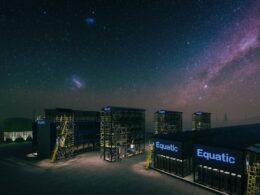A pioneering collaboration of universities and industry, spearheaded by the McKelvey School of Engineering at Washington University in St. Louis, is launching an ambitious project to revolutionise the manufacturing sector by achieving zero or negative emissions. The initiative aims to convert carbon dioxide into eco-friendly chemicals and products, promoting a circular economy.
The project, known as the Carbon Utilization Redesign for Biomanufacturing-Empowered Decarbonization (CURB) Engineering Research Center (ERC), is supported by a $26 million grant from the US National Science Foundation (NSF) for five years. This grant is one of only four awarded nationwide in 2024 and funds projects focused on research, education, commercialization, workforce development, and diversity to drive societal change.
Led by McKelvey Engineering, CURB involves collaboration with the University of Delaware, Prairie View A&M University, and Texas A&M University.
Aaron F. Bobick, dean and the James M. McKelvey Professor in McKelvey Engineering said, “The vision of CURB is as a vibrant global research and innovation ecosystem that transforms US manufacturing by capturing and leveraging carbon dioxide emissions and thereby decreasing the human ecological footprint.”
The CURB initiative will employ a Hybrid Electro-Bio CO2 Utilization System (HEBCUS) to convert waste carbon dioxide into intermediate substances like ethanol, acetate, and propionate, which can be used in biomanufacturing to produce platform chemicals, biofertilisers, and other sustainable materials. The project will develop two types of HEBCUS systems: one using microbial cells and one using enzymes, aiming for ten times the efficiency of natural processes such as photosynthesis.
Joshua Yuan, chair of the Department of Energy, Environmental & Chemical Engineering at McKelvey Engineering, the Lucy & Stanley Lopata Professor and director of CURB said, “Because of low photosynthesis efficiency, there is no way that the current bioprocesses can replace all petrochemical products using limited land and natural resources. CURB will create highly efficient chem-bio hybrid systems to convert renewable energy and carbon dioxide into chemicals, fuels and materials. This will decarbonize US manufacturing and replace a substantial amount of petrochemical products. CURB will drive a new circular carbon economy to fulfill the needs of human society while mitigating carbon emission.”
The centre is led by Yuan, with co-principal investigators Feng Jiao and Marcus Foston from WashU; Susie Dai from Texas A&M University; and Irvin W. Osborne-Lee from Prairie View A&M. The project also involves over 30 faculty members from seven universities, more than 30 corporate and educational partners, and 21 committed companies, including Brewer Science Inc., JERA Americas Inc., MilliporeSigma, Nestle Purina, Peabody, Skytree B.V., Spire, and Southwest Airlines.
“I’m thrilled that the McKelvey School of Engineering was chosen to lead this ambitious decarbonization initiative. This endeavor represents a significant investment in research and innovation, showcasing the advanced capabilities of our institution and aligning with our core mission. We look forward to collaborating with our partners to generate new opportunities and make a lasting positive impact,” Chancellor Andrew D. Martin said.
CURB is expected to generate new jobs and career opportunities, particularly in sectors challenging to decarbonise, such as chemical production. The project aims to enhance workforce skills and support US workers and their families while advancing the sustainability of American manufacturing.




















